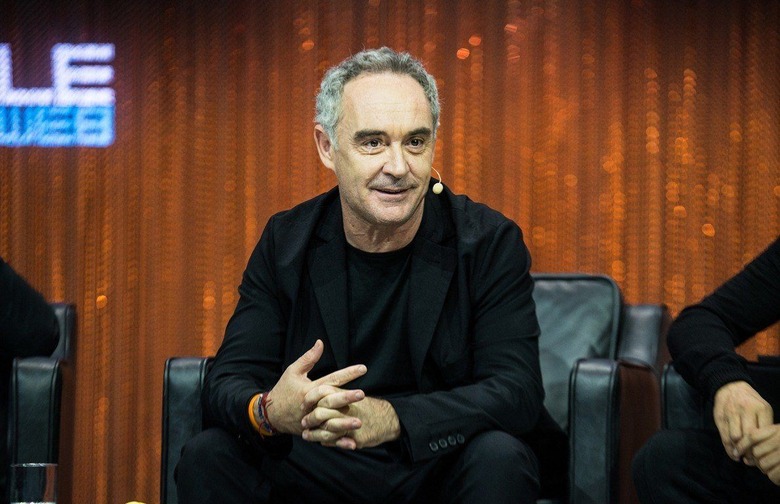The Daily Meal Hall Of Fame: Ferran Adrià
The Daily Meal is announcing the inductees into its Hall of Fame for 2016. The Hall of Fame honors key figures, both living and dead, from the world of food. We are introducing the honorees, one per weekday. Today's inductee is Ferran Adrià.
Until he stopped being a chef, in 2011, Ferran Adrià — whose now-closed elBulli restaurant, on an isolated cove near the French border in Spain's Catalonia region, was arguably the world's most famous restaurant, and the hardest to get into — was worshipped, imitated, and paid homage to in restaurant kitchens all over the world. "No one has had more of an influence on the world of cooking than Ferran Adrià," Heston Blumenthal of England's Fat Duck and Dinner, once told me.
Adrià was a young Catalan man with no formal culinary training who ended up, almost accidentally, cooking first-rate contemporary French food at elBulli in the mid-1980s. In 1987, he had an ephinany, and resolved to create his own cuisine instead of elaborating the cuisine of others. This involved a long, circuitous culinary journey, full of experimentation and unfettered imagination. Along the way, Adrià brought into his kitchen tools and machines that had previously been the preserve of commercial food producers (or of other fields entirely); introduced new ingredients, from "chemicals" like xanthan gum and maltose to unfamiliar (to Europeans) foodstuffs from Asia and South America; and just in general rethought centuries of culinary common wisdom and received knowledge, turning
it on its head. He had the inspiration and the innate ability to reimagine the most basic culinary processes, expanding the vocabulary of the kitchen beyond our wildest imaginations — reinventing food.
He also changed the way young chefs thought about cooking. Among the more celebrated alumni of Adrià's kitchen are René Redzepi, Grant Achatz, Massimo Bottura, José Andrés, Andoni Luis Aduriz, and Jason Atherton; many lesser known but successful, innovative chefs also served as interns or regular cooks at the restaurant, and virtually any chef, anywhere, who cooks modernist cuisine (or, in that now-discredited phrase, "molecular gastronomy") is a direct descendent of Adrià's.
Even chefs whose approach is more traditional, though, have learned lessons from Adrià and in many cases adopted his techniques, though they may use them far more modestly than he did. Any time you encounter a culinary foam, a liquid that has been "spherified," a dish that has been "deconstructed," a familiar food item turned with wit into something else, that's Adrià. Anytime a restaurant sets up a laboratory to develop new dishes or techniques, or takes a months-long sabbatical to refresh the creative process, or serves a long, chef-devised menu of small bites, that's him, too.
Today, Adrià's enterprises are more intellectual, less visceral, than they were even at the intellectually challenging elBulli. These include elBulliLab, where a team of about 70 creative thinkers from different disciplines works together in various not-necessarily-gastronomic approaches to "education and innovation;" elBulli1846, which later this year will bring a smaller group together, on and around the site of the original restaurant, to apply original thinking to gastronomic topics; and Bullipedia, "a Western haute cuisine Wikipedia at the service of information but also creativity." What any of this will actually mean to those who produce and consume food, at whatever level, isn't yet clear — those trying to follow Adrià's trains of thought (which often seem to be running on several tracks at once) are in for a dizzying ride — but it seems safe to say that, in whatever ways, Ferran Adrià is not finished changing the way we cook and eat.
